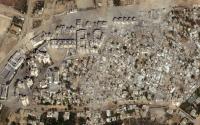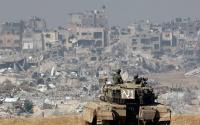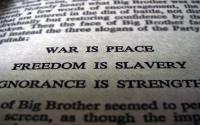Carol Brightman, AlterNetJuly 14, 2003
Viewed on July 18, 2003"Quit beating around the bush," snaps the Wall Street Journal: "America faces a guerrilla war." And so it does. But an odd paralysis still grips the U.S. military command. While the number of American soldiers killed or wounded in ambushes increases by the day, Defense Secretary Donald Rumsfeld and proconsul Paul Bremer continue to speak of "remnants" and "bitter-enders" who can't get with the program, even as word spreads through the ranks that there is a well-organized resistance campaign underway in Iraq.
When Saddam Hussein spoke in March of letting Americans into Iraqi cities, especially Baghdad, and breaking their will, he meant it. After all, his government had been training civilians in combat techniques and distributing firearms, including AK-47 rifles and rocket-propelled grenade launchers, for a year before the invasion; and U.S. planners knew it. But the Pentagon, trapped in a different scenario -- where urban guerrilla warfare was to commence (if at all) immediately after U.S. tanks entered the capital -- didn't get the message. When heavy combat operations were followed by a pronounced lull, U.S. commanders seemed to forget Saddam's warning. Now, 1st Sgt. William Taylor, based near Tikrit, cites the lull as the period when the insurgents "got their cells together."
The Pentagon, in fact, has been feeding itself its own mistaken information. Unlike the faulty weapons intelligence the White House cynically used to sell the war, U.S. military leaders seem to have believed what their analysts and Iraqi exiles were telling them. Saddam, the sources said, was incapable of participating in a guerrilla-style resistance campaign because he was accustomed to running a government, not an insurgency.
"This is not a man who is an ascetic like Osama bin Laden who is willing to go live in a cave for a long period of time and be cut off from the outside world," said Vice President Dick Cheney on Meet the Press shortly before the war began. "This is a man who's used to his palaces and his luxuries." Indeed, some senior officials half-expected an Iraqi surrender before U.S. troops even entered Iraq.
In prewar Pentagon estimates, this was to be a different war. Occupation forces would be quickly cut to 30,000 to 40,000. Small contingents of peacekeepers would remain to safeguard the reconstruction of Iraq's infrastructure, including oil pipelines and wellheads, and the building of four American military bases (one, called "intelligence city," already underway in the North).
The war itself was planned to knock out the Baath regime to make way for a government compatible with America's long-term interest in Iraq, which is (or was) to use it as a base of operations for bringing military and political pressure to bear on nations which the Bush team sees as directly or indirectly sustaining al Qaeda operations: Saudi Arabia and Iran, mainly. Equally important for U.S. strategic goals was to shock and awe not just the Iraqis but a wider Arab community with the terrifying spectacle of U.S. military technology.
Defense intellectuals in the Pentagon speak of transforming the psychological architecture of the Islamic world. Neo-con analysts, in particular, worry that the U.S. withdrawal from Beirut in 1983, followed by early withdrawals from Somalia and Afghanistan, suggest that the United States, while powerful militarily, is incapable of resolute action. In Beirut and Somalia, U.S. troops withdrew after taking minimal casualties (casualties are always "minimal" in such formulations), while in Afghanistan the U.S. halted operations after seizing a few major cities, apparently because it was unwilling to engage in more extended conflict. The American invasion of Iraq was designed to change Islamic perceptions, to provoke anger in exchange for a greater fear.
Thus, there is a grim irony to the fact that the first pillar of Middle East policy to fall in occupied Iraq is the credibility of American power. Iraqis express surprise, frustration, and fury that months after "victory" was declared, the "Authority," as the Coalition Provisional Authority is called, is unable to bring order to Baghdad. Looting and sabotage continue; electricity runs only intermittently; water and sewage systems remain unrepaired; food distribution is spotty; and medical services, overloaded with mounting casualties from the fighting, are near collapse. Meanwhile, there are no jobs for a vast unemployed workforce, which includes hundreds of thousands of demobilized Iraqi soldiers and Baathist office workers dismissed by the Authority without pay.
Why are they here? Iraqis must wonder, as they queue up in hopeless lines behind the barricaded gates of Saddam's palaces where the Americans live. It's hard to imagine a set of conditions more conducive to the conversion of a desperate citizenry into partisans for resistance. Moreover, when you consider that civilian deaths from the three-week war are estimated at 5,500 to 7,000, with military deaths exceeding 10,000, and overall nonfatal casualties totaling 50,000 -- all together touching family and friends reaching into the millions -- you have another grave condition feeding insurrection. Most of these casualties were sustained in the Sunni areas of Central Iraq where U.S. bombing was heaviest, and where the present opposition is strongest.
That the resistance will ultimately dwarf Baathist "bitter-enders" (who now include -- another grim irony -- Saddam himself) seems quite possible, especially if elements of the volatile majority of Shi'ites in the South enter the fray, along with increasing numbers of non-Iraqis.
No wonder many American soldiers are demoralized and angry. Some have written their congressmen requesting repatriation. "Most soldiers would empty their bank accounts just for a plane ticket home," runs one such letter, quoted last week in the Christian Science Monitor. And another: "The way we have been treated and the continuous lies told to our families back home has devastated us all." And another: "We feel like pawns in a game that we have no voice [in]."
Naturally the V-word: Vietnam, is turning up frequently in reports from the front. The U.S. command has certainly made the familiar moves. Outgoing Gen. Tommy Franks, facing sharp questions July 9th from the Senate Armed Services Committee, admits the current number of U.S. troops in Iraq, around 148,000, will remain for the "foreseeable future," while Secretary Rumsfeld doubled the estimated military costs to $3.9 billion a month. Meanwhile, America's promises for Iraq ride on a lie that appears more obvious each time Mr. Bremer squashes another attempt at self-governance that is not restricted to hospitals, water or electricity. Nor is the hand-picked Governing Council a substitute for home-grown representation. Washington doesn't want an independent and democratic Iraq to emerge, for one of the first moves its government would make is to order the U.S. out.
Yet there are big differences between Iraq and Vietnam, starting with the fact that in Iraq the U.S. has no indigenous support. There's no puppet army or friendly regime as there was in South Vietnam; and no counterinsurgency program with coordinated intelligence, pacification, and military arms aimed at separating the guerrillas from the population and rewarding the latter. Such operations were not in the plans, which saw "Operation Iraqi Freedom" as a show of force whose finish would be greeted by a grateful population, ready to step aside while Halliburton and Bechtel raised "Our New Baby" from the war wreckage. This, as New York Times pundit Thomas Friedman once called the reconstruction effort, would be "one of the biggest nation-building projects the U.S. has ever undertaken."
The mix of falsehood and bad faith that feeds America's Iraqi venture is probably greater than it was at the start of the Vietnam war. But the other major difference is that all Iraq is under military occupation. The ultimate in-country authority is Gen. David McKiernan, while Paul Bremer, Baghdad's de facto mayor, reports directly to Secretary Rumsfeld. A Texas millionaire and former Army officer, Roger "Buck" Walters, governs Southern Iraq, and a career Army officer who served in Vietnam and Somalia, W. Bruce Moore, runs the North. Iraqis, an educated people with some experience of empire are unlikely to kowtow to this kind of slapdash corporate-style administration.
What Team Bush faces in Iraq is more than guerrilla war. It is the first crack in the larger Mideast campaign in which Iraq was the starting point. This is the vision that has intoxicated defense planners such as Paul Wolfowitz, Richard Perle, Douglas Feith, and Kenneth Pollack for a decade. It's the dream of imposing a Pax Americana on the Arab world that is modeled on the imperial order Britain imposed in an earlier era. And it's off to a bloody bad start.
The vision appears like Banquo's ghost in the current Foreign Affairs. Alas, for author Kenneth Pollack, his essay was written before the postwar war commenced. In "Securing the Gulf," Pollack (who wrote “The Threatening Storm: The Case for Invading Iraq”) begins: "The sweeping military victory in Iraq has cleared the way for the United States to establish yet another framework for Persian Gulf security"; and explains how "In 1968, the United Kingdom relinquished its security responsibilities 'east of Suez,' leaving the United States to pick up the pieces."
Carol Brightman is a biographer and journalist whose next book, "Total Insecurity: The Myth of American Omnipotence," is due out in fall 2004.






